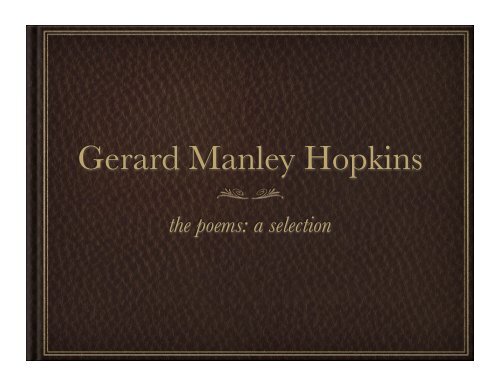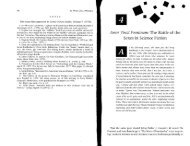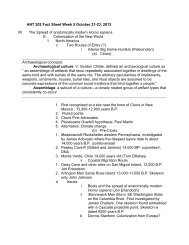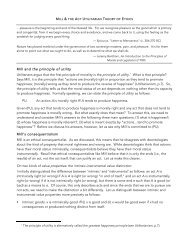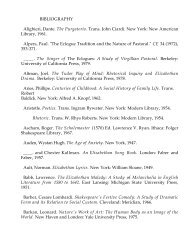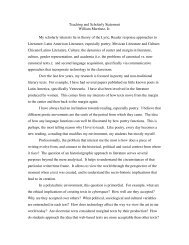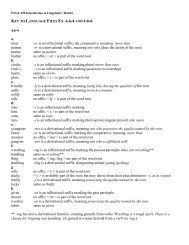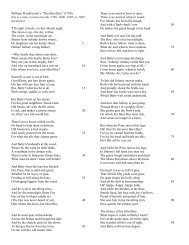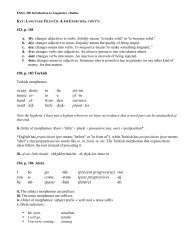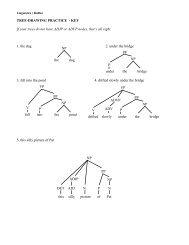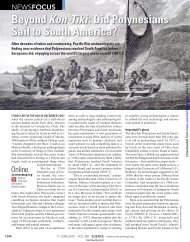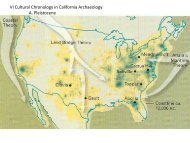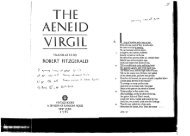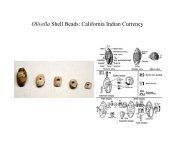Hopkins & poetry analysis
Hopkins & poetry analysis
Hopkins & poetry analysis
You also want an ePaper? Increase the reach of your titles
YUMPU automatically turns print PDFs into web optimized ePapers that Google loves.
Gerard Manley <strong>Hopkins</strong><br />
the poems: a selection
“God’s Grandeur” (1877; 1918)<br />
The world is charged with the grandeur of God,<br />
It will flame out, like shining from shook foil;<br />
It gathers to a greatness, like the ooze of oil<br />
Crushed. Why do men then now not reck his rod?<br />
Generations have trod, have trod, have trod; 5<br />
And all is seared with trade; bleared, smeared with toil;<br />
And wears man’s smudge and shares man’s smell: the soil<br />
Is bare now, nor can foot feel, being shod.
“God’s Grandeur” (1877; 1918)<br />
simile, metonymy, & metaphor<br />
The world is charged with the grandeur of God,<br />
It will flame out, like shining from shook foil;<br />
It gathers to a greatness, like the ooze of oil<br />
Crushed. Why do men then now not reck his rod?<br />
Generations have trod, have trod, have trod; 5<br />
And all is seared with trade; bleared, smeared with toil;<br />
And wears man’s smudge and shares man’s smell: the soil<br />
Is bare now, nor can foot feel, being shod.
“God’s Grandeur” (1877; 1918)<br />
simile, metonymy, & metaphor<br />
The world is charged with the grandeur of God,<br />
It will flame out, like shining from shook foil;<br />
It gathers to a greatness, like the ooze of oil<br />
Crushed. Why do men then now not reck his rod?<br />
Generations have trod, have trod, have trod; 5<br />
And all is seared with trade; bleared, smeared with toil;<br />
And wears man’s smudge and shares man’s smell: the soil<br />
Is bare now, nor can foot feel, being shod.
“God’s Grandeur” (1877; 1918)<br />
simile, metonymy, & metaphor<br />
The world is charged with the grandeur of God,<br />
It will flame out, like shining from shook foil;<br />
It gathers to a greatness, like the ooze of oil<br />
Crushed. Why do men then now not reck his rod?<br />
Generations have trod, have trod, have trod; 5<br />
And all is seared with trade; bleared, smeared with toil;<br />
And wears man’s smudge and shares man’s smell: the soil<br />
Is bare now, nor can foot feel, being shod.
“God’s Grandeur” (1877; 1918)<br />
simile, metonymy, & metaphor<br />
The world is charged with the grandeur of God,<br />
It will flame out, like shining from shook foil;<br />
It gathers to a greatness, like the ooze of oil<br />
Crushed. Why do men then now not reck his rod?<br />
Generations have trod, have trod, have trod; 5<br />
And all is seared with trade; bleared, smeared with toil;<br />
And wears man’s smudge and shares man’s smell: the soil<br />
Is bare now, nor can foot feel, being shod.
“God’s Grandeur” (1877; 1918)<br />
And for all this, nature is never spent;<br />
There lives the dearest freshness deep down things; 10<br />
And though the last lights off the black West went<br />
Oh, morning, at the brown brink eastward, springs<br />
Because the Holy Ghost over the bent<br />
World broods with warm breast and with ah! bright wings.
“God’s Grandeur” (1877; 1918)<br />
grammar play, ellipsis, & alliteration<br />
And for all this, nature is never spent;<br />
There lives the dearest freshness deep down things; 10<br />
And though the last lights off the black West went<br />
Oh, morning, at the brown brink eastward, springs<br />
Because the Holy Ghost over the bent<br />
World broods with warm breast and with ah! bright wings.
“God’s Grandeur” (1877; 1918)<br />
grammar play, ellipsis, & alliteration<br />
And for all this, nature is never spent;<br />
There lives the dearest freshness deep down things; 10<br />
And though the last lights off the black West went [away]<br />
Oh, morning, at the brown brink eastward, springs<br />
Because the Holy Ghost over the bent<br />
World broods with warm breast and with ah! bright wings.
“God’s Grandeur” (1877; 1918)<br />
grammar play, ellipsis, & alliteration<br />
And for all this, nature is never spent;<br />
There lives the dearest freshness deep down things; 10<br />
And though the last lights off the black West went<br />
Oh, morning, at the brown brink eastward, springs<br />
Because the Holy Ghost over the bent<br />
World broods with warm breast and with ah! bright wings.
“As Kingfishers Catch Fire” (1877; 1918)<br />
As kingfishers catch fire, dragonflies draw flame;<br />
As tumbled over rim in roundy wells<br />
Stones ring; like each tucked string tells, each hung bell’s<br />
Bow swung finds tongue to fling out broad its name;<br />
Each mortal thing does one thing and the same: 5<br />
Deals out that being indoors each one dwells;<br />
Selves!—goes itself; myself it speaks and spells,<br />
Crying What I do is me: for that I came.
“As Kingfishers Catch Fire” (1877; 1918)<br />
kinetic verbs, odd syntax, grammar play<br />
As kingfishers catch fire, dragonflies draw flame;<br />
As tumbled over rim in roundy wells<br />
Stones ring; like each tucked string tells, each hung bell’s<br />
Bow swung finds tongue to fling out broad its name;<br />
Each mortal thing does one thing and the same: 5<br />
Deals out that being indoors each one dwells;<br />
Selves!—goes itself; myself it speaks and spells,<br />
Crying What I do is me: for that I came.
“As Kingfishers Catch Fire” (1877; 1918)<br />
kinetic verbs, odd syntax, grammar play<br />
As kingfishers catch fire, dragonflies draw flame;<br />
As tumbled over rim in roundy wells<br />
Stones ring; like each tucked string tells, each hung bell’s<br />
Bow swung finds tongue to fling out broad its name;<br />
Each mortal thing does one thing and the same: 5<br />
Deals out that being indoors each one dwells;<br />
Selves!—goes itself; myself it speaks and spells,<br />
Crying What I do is me: for that I came.
“As Kingfishers Catch Fire” (1877; 1918)<br />
kinetic verbs, odd syntax, grammar play<br />
As kingfishers catch fire, dragonflies draw flame;<br />
As tumbled over rim in roundy wells<br />
Stones ring; like each tucked string tells, each hung bell’s<br />
Bow swung finds tongue to fling out broad its name;<br />
Each mortal thing does one thing and the same: 5<br />
Deals out that being indoors each one dwells;<br />
Selves!—goes itself; myself it speaks and spells,<br />
Crying What I do is me: for that I came.
“As Kingfishers Catch Fire” (1877; 1918)<br />
I say more: the just man justices;<br />
Keeps gráce: thát keeps all his goings graces; 10<br />
Acts in God’s eye what in God’s eye he is—<br />
Chríst. For Christ plays in ten thousand places,<br />
Lovely in limbs, and lovely in eyes not his<br />
To the Father through the features of men’s faces.
“As Kingfishers Catch Fire” (1877; 1918)<br />
“sprung rhythm” [below: one possible scansion]<br />
| I say | more: the | just | man | justices;<br />
| Keeps | gráce: | thát | keeps all his | goings graces; 10<br />
| Acts in | God’s | eye what in | God’s | eye he is—<br />
| Chríst. For | Christ | plays in ten | thousand | places,<br />
| Lovely in | limbs, and | lovely in | eyes | not his<br />
| To the | Father through the | features of | men’s | faces.
interrupt slideshow:<br />
look at “Pied Beauty”<br />
in Norton, Vol. E (1518)
“Hurrahing in Harvest” (1877; 1918)<br />
Summer ends now; now, barbarous in beauty, the stooks<br />
rise<br />
Around; up above, what wind-walks! what lovely behaviour<br />
Of silk-sack clouds! has wilder, willful-wavier<br />
Meal-drift moulded ever and melted across skies?
“Hurrahing in Harvest” (1877; 1918)<br />
pairings, compounds, personification, metaphor<br />
Summer ends now; now, barbarous in beauty, the stooks<br />
rise<br />
Around; up above, what wind-walks! what lovely behaviour<br />
Of silk-sack clouds! has wilder, willful-wavier<br />
Meal-drift moulded ever and melted across skies?
“Hurrahing in Harvest” (1877; 1918)<br />
pairings, compounds, personification, metaphor<br />
Summer ends now; now, barbarous in beauty, the stooks<br />
rise<br />
Around; up above, what wind-walks! what lovely behaviour<br />
Of silk-sack clouds! has wilder, willful-wavier<br />
Meal-drift moulded ever and melted across skies?
“Hurrahing in Harvest” (1877; 1918)<br />
pairings, compounds, personification, metaphor<br />
Summer ends now; now, barbarous in beauty, the stooks<br />
rise<br />
Around; up above, what wind-walks! what lovely behaviour<br />
Of silk-sack clouds! has wilder, willful-wavier<br />
Meal-drift moulded ever and melted across skies?
“Hurrahing in Harvest” (1877; 1918)<br />
pairings, compounds, personification, metaphor<br />
Summer ends now; now, barbarous in beauty, the stooks<br />
rise<br />
Around; up above, what wind-walks! what lovely behaviour<br />
Of silk-sack clouds! has wilder, willful-wavier<br />
Meal-drift moulded ever and melted across skies?
“Hurrahing in Harvest” (1877; 1918)<br />
I walk, I lift up, I lift up heart, eyes, 5<br />
Down all that glory in the heavens to glean our Saviour;<br />
And, éyes, heárt, what looks, what lips yet gave you a<br />
Rapturous love’s greeting of realer, of rounder replies?
“Hurrahing in Harvest” (1877; 1918)<br />
repetition, paradox, question<br />
I walk, I lift up, I lift up heart, eyes, 5<br />
Down all that glory in the heavens to glean our Saviour;<br />
And, éyes, heárt, what looks, what lips yet gave you a<br />
Rapturous love’s greeting of realer, of rounder replies?
“Hurrahing in Harvest” (1877; 1918)<br />
repetition, paradox, question<br />
I walk, I lift up, I lift up heart, eyes, 5<br />
Down all that glory in the heavens to glean our Saviour;<br />
And, éyes, heárt, what looks, what lips yet gave you a<br />
Rapturous love’s greeting of realer, of rounder replies?
“Hurrahing in Harvest” (1877; 1918)<br />
repetition, paradox, question<br />
I walk, I lift up, I lift up heart, eyes, 5<br />
Down all that glory in the heavens to glean our Saviour;<br />
And, éyes, heárt, what looks, what lips yet gave you a<br />
Rapturous love’s greeting of realer, of rounder replies?
“Hurrahing in Harvest” (1877; 1918)<br />
And the azurous hung hills are his world-wielding<br />
shoulder<br />
Majestic—as a stallion stalwart, very-violet-sweet! 10<br />
These things, these things were here and but the beholder<br />
Wanting; which two when they once meet,<br />
The heart rears wings bold and bolder<br />
And hurls for him, O half hurls earth for him off under his<br />
feet.
“Hurrahing in Harvest” (1877; 1918)<br />
surprising combinations, repetition, oxymoron<br />
And the azurous hung hills are his world-wielding<br />
shoulder<br />
Majestic—as a stallion stalwart, very-violet-sweet! 10<br />
These things, these things were here and but the beholder<br />
Wanting; which two when they once meet,<br />
The heart rears wings bold and bolder<br />
And hurls for him, O half hurls earth for him off under his<br />
feet.
“Hurrahing in Harvest” (1877; 1918)<br />
surprising combinations, repetition, oxymoron<br />
And the azurous hung hills are his world-wielding<br />
shoulder<br />
Majestic—as a stallion stalwart, very-violet-sweet! 10<br />
These things, these things were here and but the beholder<br />
Wanting; which two when they once meet,<br />
The heart rears wings bold and bolder<br />
And hurls for him, O half hurls earth for him off under his<br />
feet.
“Hurrahing in Harvest” (1877; 1918)<br />
surprising combinations, repetition, oxymoron<br />
And the azurous hung hills are his world-wielding<br />
shoulder<br />
Majestic—as a stallion stalwart, very-violet-sweet! 10<br />
These things, these things were here and but the beholder<br />
Wanting; which two when they once meet,<br />
The heart rears wings bold and bolder<br />
And hurls for him, O half hurls earth for him off under his<br />
feet.
“[Carrion Comfort” (1885; 1918)<br />
Not, I’ll not, carrion comfort, Despair, not feast on thee,<br />
Not untwist—slack they may be—these last strands of man<br />
In me ór, most weary, cry I can no more. I can;<br />
Can something, hope, wish day come, not choose not to be.
“[Carrion Comfort” (1885; 1918)<br />
metaphor, unexpected clarity, double negative<br />
Not, I’ll not, carrion comfort, Despair, not feast on thee,<br />
Not untwist—slack they may be—these last strands of man<br />
In me ór, most weary, cry I can no more. I can;<br />
Can something, hope, wish day come, not choose not to be.
“[Carrion Comfort” (1885; 1918)<br />
metaphor, unexpected clarity, double negative<br />
Not, I’ll not, carrion comfort, Despair, not feast on thee,<br />
Not untwist—slack they may be—these last strands of man<br />
In me ór, most weary, cry I can no more. I can;<br />
Can something, hope, wish day come, not choose not to be.
“[Carrion Comfort” (1885; 1918)<br />
metaphor, unexpected clarity, double negative<br />
Not, I’ll not, carrion comfort, Despair, not feast on thee,<br />
Not untwist—slack they may be—these last strands of man<br />
In me ór, most weary, cry I can no more. I can;<br />
Can something, hope, wish day come, not choose not to be.
“[Carrion Comfort” (1885; 1918)<br />
But ah, but O thou terrible, why wouldst thou rude on me<br />
Thy wring-world right foot rock? lay a lionlimb against me?<br />
scan<br />
With darksome devouring eyes my bruised bones? and fan,<br />
O in turns of tempest, me heaped there; me frantic to avoid<br />
thee and flee?
“[Carrion Comfort” (1885; 1918)<br />
grammar play, new compounds<br />
But ah, but O thou terrible, why wouldst thou rude on me<br />
Thy wring-world right foot rock? lay a lionlimb against me?<br />
scan<br />
With darksome devouring eyes my bruised bones? and fan,<br />
O in turns of tempest, me heaped there; me frantic to avoid<br />
thee and flee?
“[Carrion Comfort” (1885; 1918)<br />
grammar play, new compounds<br />
But ah, but O thou terrible, why wouldst thou rude on me<br />
Thy wring-world right foot rock? lay a lionlimb against me?<br />
scan<br />
With darksome devouring eyes my bruised bones? and fan,<br />
O in turns of tempest, me heaped there; me frantic to avoid<br />
thee and flee?
“[Carrion Comfort” (1885; 1918)<br />
Why? That my chaff might fly; my grain lie, sheer and<br />
clear.<br />
Nay in all that toil, that coil, since (seems) I kissed the rod,<br />
Hand rather, my heart lo! lapped strength, stole joy, would<br />
laugh, chéer.<br />
Cheer whom though? The Hero whose heaven-handling<br />
flung me, fóot tród<br />
Me? or me that fought him? O which one? Is it each one?<br />
That night, that year<br />
Of now done darkness I wretch lay wrestling with (my God!)
“[Carrion Comfort” (1885; 1918)<br />
tensions<br />
Why? That my chaff might fly; my grain lie, sheer and<br />
clear.<br />
Nay in all that toil, that coil, since (seems) I kissed the rod,<br />
Hand rather, my heart lo! lapped strength, stole joy, would<br />
laugh, chéer.<br />
Cheer whom though? The Hero whose heaven-handling<br />
flung me, fóot tród<br />
Me? or me that fought him? O which one? Is it each one?<br />
That night, that year<br />
Of now done darkness I wretch lay wrestling with (my God!)


